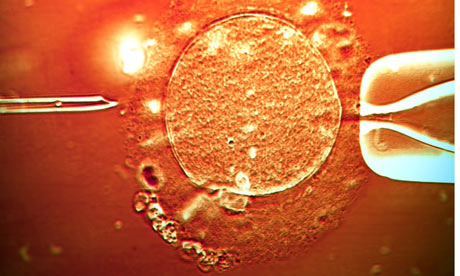
'I'm here to talk to you about the Fertility Center of Las Vegas," smiles a blonde American woman as a small group gathers tentatively around her stand. She hands out sheets of data on the clinic's IVF live births and tells us why fertility treatment in Las Vegas is the way forward. "Our 2009 statistics are amazing."
One woman looks downcast. "What's the point of going to Vegas if you can't even drink or smoke?" "Well at least you can take in a few shows while you're with us. You're still young right – 28, 29?" quizzes the American. "I wish I was that young," says the onlooker pointedly. "I wouldn't have to be here would I?"
Welcome to the UK's first Fertility Show. The two-day event, which took place at the weekend, has been described as an "Ideal Home Exhibition for making babies" and will run annually at Olympia in west London for the next three years. Organised in association with Infertility Network UK (a charity that offers advice and information to people with infertility problems), there is a dizzying array of exhibitors; over 40 IVF specialists, clinics offering on-the-spot fertility tests and information on egg freezing, sperm banks, nutritionists, acupuncturists and the latest advice on donor conception.
The atmosphere is upbeat and business is brisk; brochures and business cards are thrust into your hands and everyone wants to engage you in conversation about their latest technique. "Today is all about hope," says the organiser Jonathan Scott. Yet it doesn't make one feel entirely easy seeing big business tap such an emotive market. Increasing numbers of people are undergoing IVF treatment: latest figures available are for 2007, which saw a 5.8% rise on the previous year to 36,861. Eighty per cent will fund IVF themselves and the fertility industry is now worth an estimated £500m a year in the UK. Many couples here, certainly the handful I spoke to, have been trying for months or years to conceive against diminishing odds and have already spent thousands of pounds trying to do so. In 2007, only 23.7% of all IVF treatments were successful.
"It is certainly up there in the taboo areas," agrees Scott, who has a background in more commercial exhibitions but worked on this one for free as a "labour of love". "The box office went crazy and we sold more than 3,000 tickets. It could have been a fiasco; you could have said, 'What's next, the cancer show?' But it's a success – I think it really offers access to knowledge, that's what it's all about."
A once-around the hall leaves me with an impression of a wild frontier where anything goes; from the medically proven to the downright loopy. Positioned behind a reassuringly sensible looking stand run by Chelsea & Westminster Assisted Conception Unit is a business that calls itself "Fertility Astrology", which claims to be able to assess the quality of your eggs by mapping your stars. A specialist from the Chelsea & Westminster is bemused by the contrasts. "There's somewhere round here that sells a lubricant to give your sperm a bit of oomph," she rolls her eyes. "We know that's not going to work."
But there are also informative lectures, clearly aimed at educating rather than just flogging products. I catch the end of one doctor's talk to a crowded auditorium about polycystic ovary syndrome. Another advises potential IVF patients on how to assess a clinic's success rates.
"It's been so helpful," says Jennie Alway, 42, from Berkshire. "What's great is to get to hear specialists you'd normally have to wait months to talk to at a clinic," she says. "At least here you feel you're not alone; the only one going through this." Always has been trying to conceive for nearly seven years and has so far spent around £40,000 on fertility treatments. She's still shopping around. "I'm currently seeing Dr Taranissi [one of the UK's most successful private IVF doctors] but I've seen one lecture about a new technique in improved embryo screening that sounded so impressive I may switch to try it."
Hovering nearby is Sophie (not her real name), an American in her early 30s who has only recently started trying to conceive. She's been here 20 minutes and already has a full shopping bag. "Ovulation kits mainly," she says. Does she find the concept of an Ideal Home Show for making babies a little bit strange? "Not really. I understand why the NHS can't treat every woman who wants IVF and so they have to go private – they need information and that's why I guess this is useful." She heads off towards a stall called "Innermost Secrets", encouraging younger women to check their fertility levels before it's too late.

